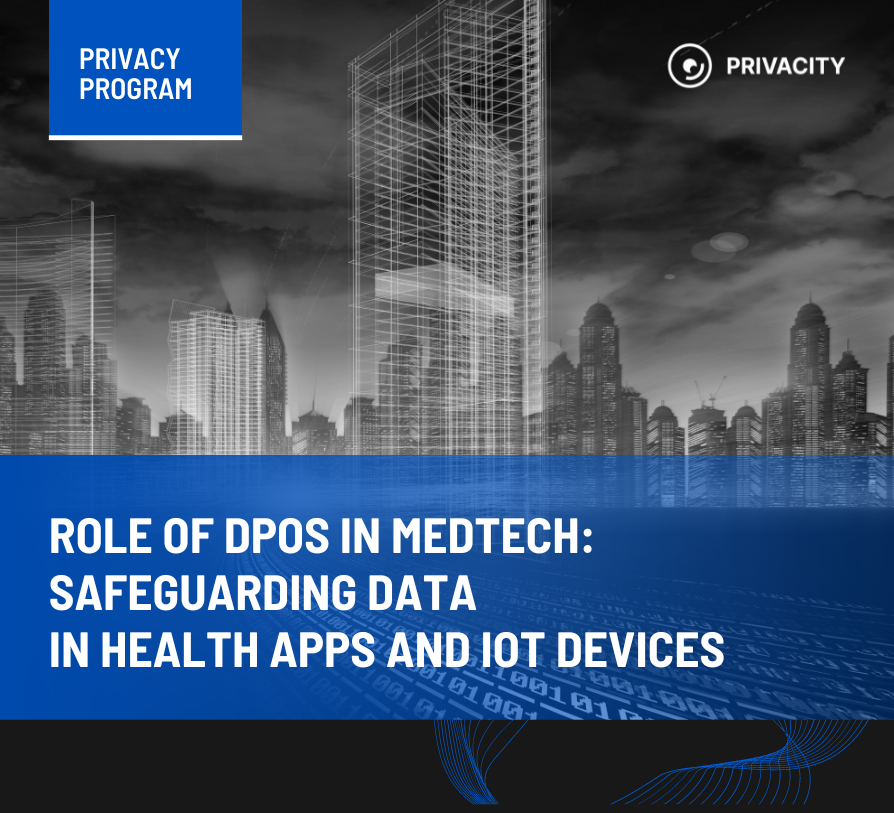Why does every MedTech company need a Data Protection Officer?
The healthcare industry worldwide has profited enormously from digitalisation. AI and other technologies have also advanced its reach and services. However, these developments require a thorough approach to data protection and patient privacy. Patients’ sensitive personal data might be misused without carefully considering compliance standards, and data breaches might cause irreversible harm.
The critical need for robust data protection in MedTech derives from the industry’s nature. MedTech companies control and process sensitive medical and health-related information (PHI), such as biometric data or the medical history of a person (a data subject). When there are no adequate data protection measures, the risk of a data breach leading to severe consequences is relatively high. This might include identity theft, discrimination or psychological harm. The trust of patients is crucial for any MedTech company, and it can only be maintained with compliance with data protection regulations and high ethical standards embedded in them.
Besides industry-specific reasons, there are other general considerations requiring special attention. Any company that continues to grow has to handle a larger amount of personal data with time. This increases the risk of a data breach, which can lead to far-reaching consequences in the case of MedTech.
Regulatory frameworks such as the General Data Protection Regulation (GDPR) in the European Union and the Health Insurance Portability and Accountability Act (HIPAA) in the United States introduce strict requirements for handling personal data. While navigating data protection regulations might seem complicated, many solutions already exist to help MedTech companies adhere to privacy standards. One convenient way to ensure that the advancement of technology and its use are aligned with the legal requirements is by appointing a Data Protection Officer.
Appointment of a Data Protection Officer (DPO) in MedTech Companies: Not Just a Need but a Necessity
According to the European Data Protection Supervisor (EDPS), the main role of the Data Protection Officer (DPO) is to ensure that the organisation processes the personal data of its staff, customers, providers or any other individuals in compliance with the applicable data protection rules. Given that MedTech companies operate in a highly regulated environment where they must comply with numerous laws, a DPO is a crucial need in these circumstances.
DPO has the expertise to ensure compliance with data protection regulations and may help companies avoid high fines and other legal sanctions. The DPO acts as a liaison with regulatory authorities, particularly the data protection authority, and ensures that all data protection policies and procedures are up-to-date and effectively implemented.
Moreover, in some cases, the appointment of a DPO is a direct requirement under the GDPR. For example, Article 37 of the GDPR reiterates that it is mandatory when the company’s core activities involve regular and systematic monitoring of data subjects on a large scale or when the core company´s activities consist of processing sensitive personal data or data on a large scale. Considering the nature of MedTech companies, such operations might constitute their core activities. Thus, the appointment of a DPO is a requirement to be met in such a case.
Privacy Guardians: How DPOs Ensure Compliance in Health Monitoring Apps and MedTech Innovations
The rapid development of technologies boosted the MedTech industry. Various tech solutions benefitted both companies and patients. During the COVID-19 pandemic, telemedicine platforms and health-tracking apps proved themselves decent support for “traditional” health providers. DPO helps to ensure that data protection and innovative approaches are mutually enhancing and do not exclude each other. There are only some examples of how DPO can ensure compliance with data protection regulations while helping the company continue its work.

One of the most common examples of IT solutions in modern hospitals is electronic health records (EHR) systems. Also, telemedicine platforms and hospital management systems continue to grow. They play an essential role in the automatisation of administrative tasks and enabling remote consultations in many health institutions. The DPO’s participation in such cases is vital, as they have to ensure a comprehensive mapping of personal data flows in such systems.
Additionally, DPO has to provide Privacy Impact Assessments (PIAs) and establish policies that ensure data minimisation and retention. Also, training personnel and raising awareness about data privacy would be significantly important activities.
Health monitoring applications have become an ordinary part of everyday life for many people. They can monitor diet or exercise routines and assist in tracking physical activity and sleep patterns. All this highly sensitive personal data requires special consideration. Therefore, the role of DPO would be highly important in ensuring the consent management of users, ensuring transparency of the company policies and completing third-party audits.
IoT Devices for health monitoring continuously track heart rate and other vital signs. They can come in the form of smartwatches or other wearables. DPO’s responsibility in such cases would include various compliance checks, PIAs, checking the data encryption and managing third-party audits.
Conclusion
To conclude, DPOs play a crucial role in the MedTech industry. They ensure that MedTech companies, particularly those involved in hospital automation, health monitoring applications, online patient portals, IoT devices, and fitness wearables, adhere to data protection regulations.
By implementing robust data protection measures, conducting regular audits, and promoting transparency and user awareness, the DPO helps safeguard sensitive health data and maintain compliance with laws such as GDPR and CCPA.
Contact us if you need more information about the DPO’s participation in your company.

